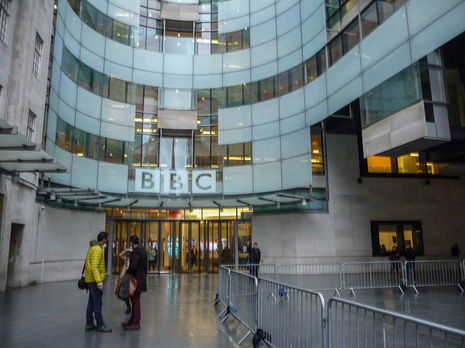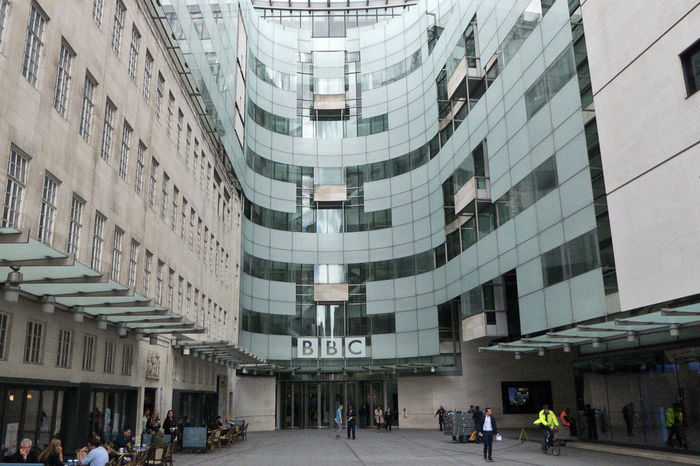In defence of the BBC
Jake Rose explores the patriotism he feels towards one of Britain’s most famous institutions as makes the case for the promotion and protection of the BBC.

The list of things I am willing to put my two shillings in the patriotic hat for is quite small. But it’s not empty. If there’s one thing that I will make my hill to die on – and be damned, I’ll build the hill myself if I have to – it’s the BBC.
The state broadcaster that’s too far right for the left and too far left for the right; has license fees that are too expensive, or too cheap; and makes shows that are too successful, or not successful enough. As with any good staple of national culture, the BBC divides opinion.
Until 1955, with the introduction of ITV, the BBC had a monopoly on broadcasting. Since then, despite fierce competition, it has expanded its roster to include a host of local, national, and international radio and TV stations. It’s worth noting how massive an operation this is: there are nationally broadcast stations providing just about every genre you can imagine, from spoken word poetry read by Cillian Murphy to current hit music on the radio, from documentaries on spiders to the newest films. Internationally, there is just as much variety. On top of this, we have BBC iPlayer. Oh, and it’s all ad-free.
“Creativity, freedom, invention, and discovery form the core of the BBC – and thus our culture.”
It does all this for £3 a week per house. If you live in a typical family of four, that’s 75p per person, per week. Netflix will cost you £3.50 a week. I’m not intending to discourage Netflix – they just aren’t the same. The BBC isn’t even competing with Netflix; it doesn’t have to. Its funding is guaranteed by the TV license. This simple condition is what helps liberate it from political control and to produce shows that just wouldn’t be produced by a for-profit company like Netflix. In fact, the BBC has a constitutional obligation to make ”distinctive content“. It, by law, has to be different and for good reason. Productions that push our culture forward are seldom the same as their contemporaries. Creativity, freedom, invention, and discovery form the core of the BBC – and thus our culture.
Perhaps one of the BBC’s most self-defeating features is its humility. It doesn’t show itself off. It’s a rare sight to see advertisements for any productions offered by the BBC besides on its own channels, although there are exceptions. Unlike Disney and Netflix, companies that seem to want to burn their logo onto the average human’s retina, the BBC simply has faith that you will hear about the quality of their shows.
I’ll admit, in the age of advertisement and social media this does seem rather silly. The BBC is undoubtedly struggling to attract younger viewers, despite its incredibly successful productions. Normal People was an incredibly popular program among 15-25 year olds, for example. On the radio, the BBC caters massively to the young audience: it regularly plays popular music across a variety of genres, as well as promoting up-and-coming artists through BBC Introducing. Let’s not forget the high quality audio dramas and podcasts with our favourite comedians, writers, scientists – the list goes on. The BBC genuinely makes lots of content for young people.
A nearly free and limitless content source available every day of the year without a single advertisement – it almost sounds too good to be true.
“The BBC simply has faith that you will hear about the quality of their shows.”
In terms of news, the BBC is a world leader. Its impartiality is, again, guaranteed by constitution: it promises to provide impartial news and information to help people understand and engage with the world around them.
In a polarised political landscape – where you’re either a snowflake or a racist – the BBC has defined impartiality poorly: delivering only the neutral facts. It doesn’t often comment on them, and certainly doesn’t question the powers that be. It’s harsh to say that the BBC has lost its spine, but it’s not far off. The Brexit campaign was the eye opening event for this: despite numerous false claims made by the leave campaign, the BBC failed to counter them. In the words of a BBC presenter, ”we still don’t know how to deal with politicians who’ve discovered that they profit from lying“.
Sigh. I never said the BBC didn’t have issues, just publicly funded issues are better than private ones. And unlike those private issues, you’ll hear all about the BBC’s: it’s a waste of money, it should be privatised to encourage competition, it should advertise and end the TV license. The BBC will receive these complaints as long as it exists. Maybe one day we’ll start to believe the people behind them. But I think we’d miss the BBC.
John Reith, the father of the BBC, had a very important maxim: “educate, inform, and entertain”. It is still a main part of the BBC’s mission statement today. It is something that, on average, the BBC has done better and more consistently than any other organisation. At a fundamental level, it is a vital organ of the British arts, a consistently undervalued part of our economy and culture. From our favourite shows to our favourite characters and most beloved educators, the BBC has played a major role role in the diffusion of culture – and continues to do so. It’s still training new script writers, producers, actors, and camera operators. It’s still starting careers, educating us and our children, and allowing us to tell our stories. And everyone is still following.
 Comment / Plastic pubs: the problem with Cambridge alehouses 5 January 2026
Comment / Plastic pubs: the problem with Cambridge alehouses 5 January 2026 News / New movement ‘Cambridge is Chopped’ launched to fight against hate crime7 January 2026
News / New movement ‘Cambridge is Chopped’ launched to fight against hate crime7 January 2026 News / Uni-linked firms rank among Cambridgeshire’s largest7 January 2026
News / Uni-linked firms rank among Cambridgeshire’s largest7 January 2026 News / SU stops offering student discounts8 January 2026
News / SU stops offering student discounts8 January 2026 News / Cambridge businesses concerned infrastructure delays will hurt growth5 January 2026
News / Cambridge businesses concerned infrastructure delays will hurt growth5 January 2026









